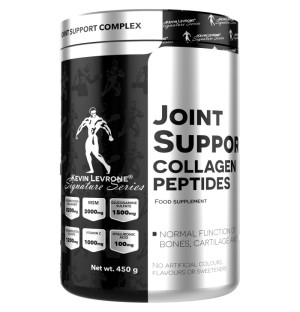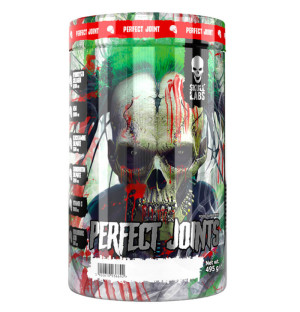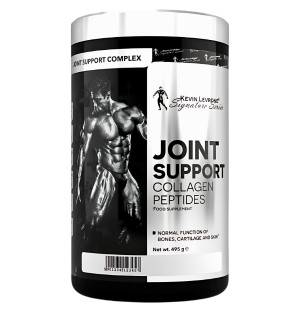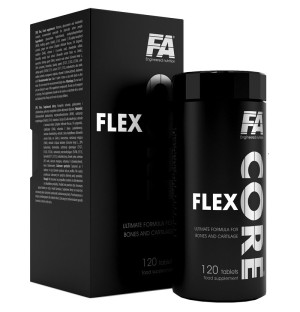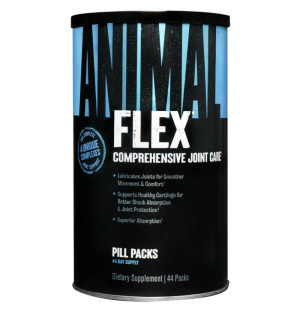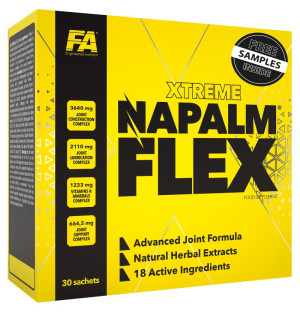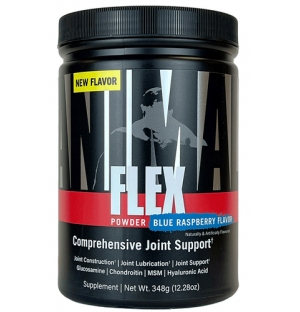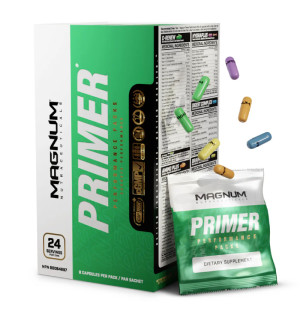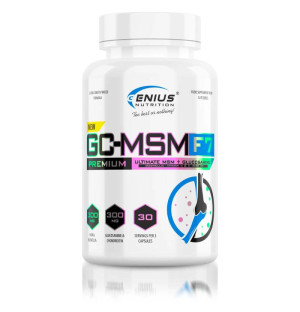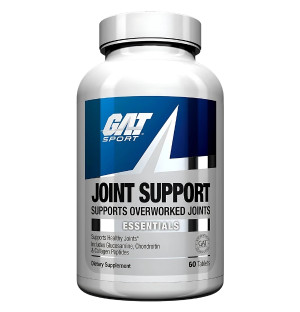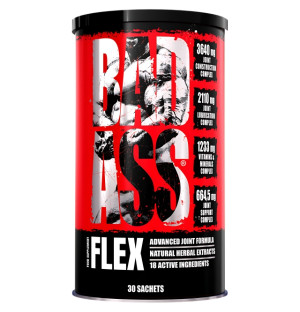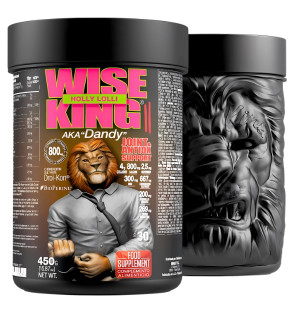Joint Regeneration
Joints are synovial connections found in movable bone joints, which are crucial for our daily mobility and agility. They are made up of the joint capsule, articular surfaces, and joint cavities, often reinforced by ligaments, as in the case of the knee joint. Healthy joints require adequate physical activity, a balanced diet, and sometimes additional support in the form of supplements. At GymHub.pro, you will find a range of proven and safe products that will help regenerate your joints and maintain their optimal condition for many years.
What is joint regeneration?
Joint regeneration is the process of rebuilding and strengthening joint structures, which can be supported both by a proper lifestyle and supplementation. With age and as a result of intense physical activity, the cartilage and synovial fluid gradually wear out, which can lead to pain, stiffness, and limited mobility.
The most common joint problems result from several factors:
- Overuse caused by prolonged, excessive physical exertion
- Improper exercise technique
- Poorly balanced diet, lacking essential nutrients
- Insufficient recovery after exercise
- Previous mechanical injuries
- Natural aging process and loss of synovial fluid
Proper joint regeneration relies on providing the body with substances that are natural building blocks of cartilage and synovial fluid. These ingredients can be supplied both through diet and supplementation, which is often necessary when the body cannot produce them in sufficient amounts.
Types of Joint Supplements
Collagen for Joints
Collagen is a fundamental component of joint cartilage, responsible for its elasticity and strength. Different types of collagen exist in the body, but type II collagen is most important for joint health, being the main component of joint cartilage.
The amount of collagen in our body decreases with age, so supplementation is particularly recommended for older individuals and those struggling with osteoarthritis, rheumatism, or arthritis. Collagen helps relieve pain and supports cartilage tissue regeneration.
Recommended daily dose: from 2.5 g to 10 g per day.
Hyaluronic Acid for Joints
Hyaluronic acid is a natural component of synovial fluid, responsible for its viscosity and lubricating properties. Its main task is to bind water and ensure adequate moisture, which is crucial for smooth joint movement.
Supplements with low molecular weight hyaluronic acid can be an effective support for people with limited joint mobility and pain resulting from synovial fluid deficiency.
Recommended daily dose: no more than 100 mg per day.
Glucosamine for Joints
Glucosamine is a chemical compound naturally synthesized in the body from glucose and glutamine, found in connective tissue and joints. It is a basic building block of joint cartilage and synovial fluid.
The most effective form of supplementation is glucosamine sulfate, which helps alleviate joint inflammation, reduces pain, and supports cartilage regeneration. Glucosamine is especially effective when combined with chondroitin.
Recommended daily dose: 1500 mg per day, preferably divided into 3 doses of 500 mg, taken with meals.
Chondroitin for Joints
Chondroitin is one of the main components of connective tissue, which stimulates the production of synovial fluid, especially hyaluronic acid. Chondroitin sulfate is the most effective form of this compound and is often found in supplements combined with glucosamine.
Regular use of chondroitin supports the body's natural ability to produce synovial fluid, reduces pain, and improves joint function.
Recommended daily dose: from 800 to 1200 mg.
MSM for Joints
MSM (methylsulfonylmethane) is an active, organic sulfur compound that positively affects joint function. MSM alleviates pain, reduces swelling, increases joint flexibility, and participates in collagen production.
Recommended daily dose: around 1 g per day with regular use, although higher doses may also be used in certain protocols.
Effects and Benefits of Joint Supplements
Properly selected supplementation can bring a range of benefits for joint health:
- Reduction of pain and inflammation - ingredients such as glucosamine, chondroitin, and MSM have anti-inflammatory properties that help alleviate pain and minimize inflammation
- Improved joint mobility - supplements supporting synovial fluid production (hyaluronic acid, chondroitin) contribute to better joint lubrication
- Regeneration of joint cartilage - collagen, glucosamine, and chondroitin provide the building blocks necessary for repairing damaged cartilage tissue
- Slowing degenerative processes - regular supplementation can slow degenerative processes, especially in physically active and older individuals
- Improved overall physical fitness - healthy joints are the foundation of physical activity, which translates into a better quality of life
Who Should Use Joint Regeneration Supplements?
Supplements supporting joint regeneration are particularly recommended for:
- Physically active individuals - especially those engaging in sports that strain the joints, such as running, weightlifting, or team sports
- Older individuals - whose collagen and synovial fluid production naturally decreases
- Overweight individuals - excess weight places additional strain on the joints, requiring enhanced support
- Individuals recovering from injuries - to speed up the regeneration of damaged joint structures
- People with degenerative joint diseases - as a supplement to doctor-prescribed therapy
- People leading a sedentary lifestyle - prolonged sitting can negatively affect joint condition
How to Use Joint Supplements?
To achieve the best effects from supplementation, it's important to follow a few guidelines:
- Consistency - joint supplements work most effectively with regular, long-term use (at least several weeks)
- Proper dosing - always follow the recommendations of the manufacturer or a specialist
- Comprehensive approach - the best results come from combining different active ingredients (e.g., glucosamine + chondroitin)
- Dietary support - supplementation should complement a balanced diet rich in:
- Fatty fish (source of omega-3 fatty acids)
- Citrus fruits and berries (source of vitamin C)
- Leafy green vegetables (source of magnesium)
- Dairy (source of calcium and vitamin D)
- Physical activity - properly selected exercises strengthen the muscles around joints and increase their mobility
Safety and Side Effects
Joint supplements are generally safe when used according to the recommendations, but it's important to keep in mind potential contraindications:
- Individuals with seafood allergies should be cautious when using glucosamine (often derived from shellfish)
- Individuals with blood clotting disorders or those taking anticoagulants should consult a doctor before using chondroitin
- High doses of MSM may cause nausea, headaches, or stomach problems
- Pregnant and breastfeeding women should consult a doctor before using joint supplements
Frequently Asked Questions (FAQ)
What is lacking in the body when joints hurt?
Joint pain may signal deficiencies of several nutrients, including:
- Vitamin C - essential for collagen production
- Hyaluronic acid - responsible for synovial fluid production
- Chondroitin sulfate and glucosamine - supporting cartilage health
- Vitamin D - crucial for bone health
- Omega-3 fatty acids - with anti-inflammatory effects
- Magnesium and phosphorus - important for bone and joint health
Does vitamin B12 affect the joints?
Vitamin B12 may have a positive effect on joints, mainly through supporting the health of the nervous system and reducing pain. Supplementation with vitamin B12 can be particularly beneficial for older individuals and vegetarians.
What should you eat to prevent joint pain?
A diet supporting joint health should be rich in:
- Fatty fish, nuts, and seeds (source of omega-3 fatty acids)
- Citrus fruits and berries (source of vitamin C supporting collagen production)
- Leafy green vegetables and dairy (source of magnesium and vitamin D)
How quickly can you notice the effects of supplementation?
The first effects of supplementation can be noticed after about 4-6 weeks of regular use. Full benefits may be visible after 3-6 months. It's important to remember that joint supplements work cumulatively and require patience.
Can joint supplements replace painkillers?
Joint supplements are not medications and should not replace doctor-prescribed pharmacotherapy. However, they can be a valuable complement to therapy and, in some cases, allow for a reduction in painkiller doses. Always consult your doctor before changing your medication regimen.
Why Buy from GymHub.pro?
At GymHub.pro, we offer only proven and safe joint supplements from reputable manufacturers. Our products:
- Contain optimal doses of active ingredients
- Are regularly tested for quality and purity
- Have complete documentation and certifications
- Are available in different forms (capsules, tablets, liquids) for your convenience
Our team of experts provides professional advice on selecting the right products tailored to your individual needs. We ensure that every customer receives a high-quality product that effectively supports their joint health.
Legal Disclaimer
The information on this website is for educational purposes only and does not constitute medical advice. Dietary supplements should not be used as a substitute for a varied diet. Before starting joint supplementation, especially if you have existing health conditions or are taking medications, it is recommended to consult with a doctor or pharmacist. The information presented regarding supplement effects has not been evaluated by the Chief Sanitary Inspectorate. The products available at GymHub.pro are not intended for diagnosing, treating, preventing, or alleviating symptoms of diseases.

